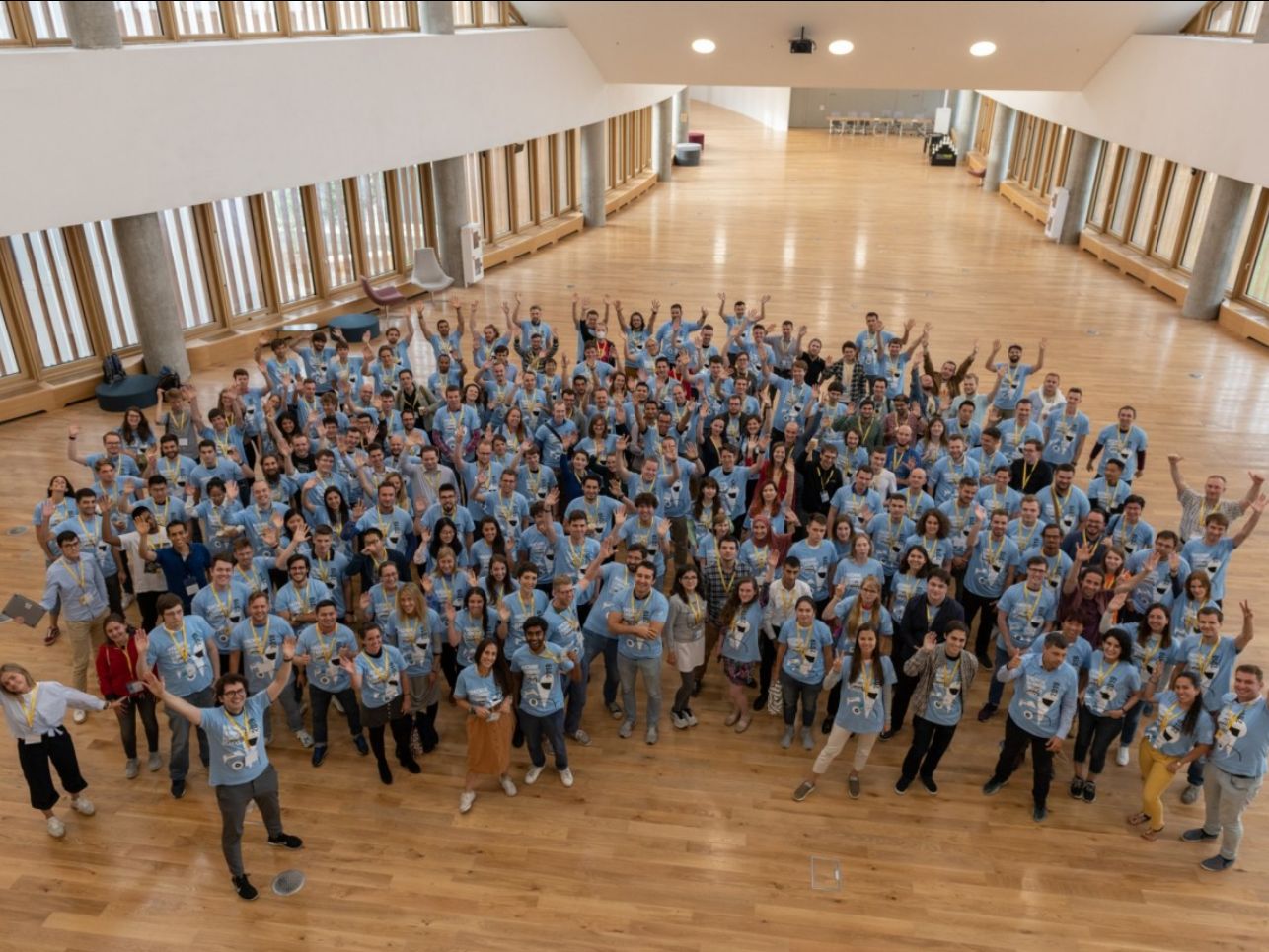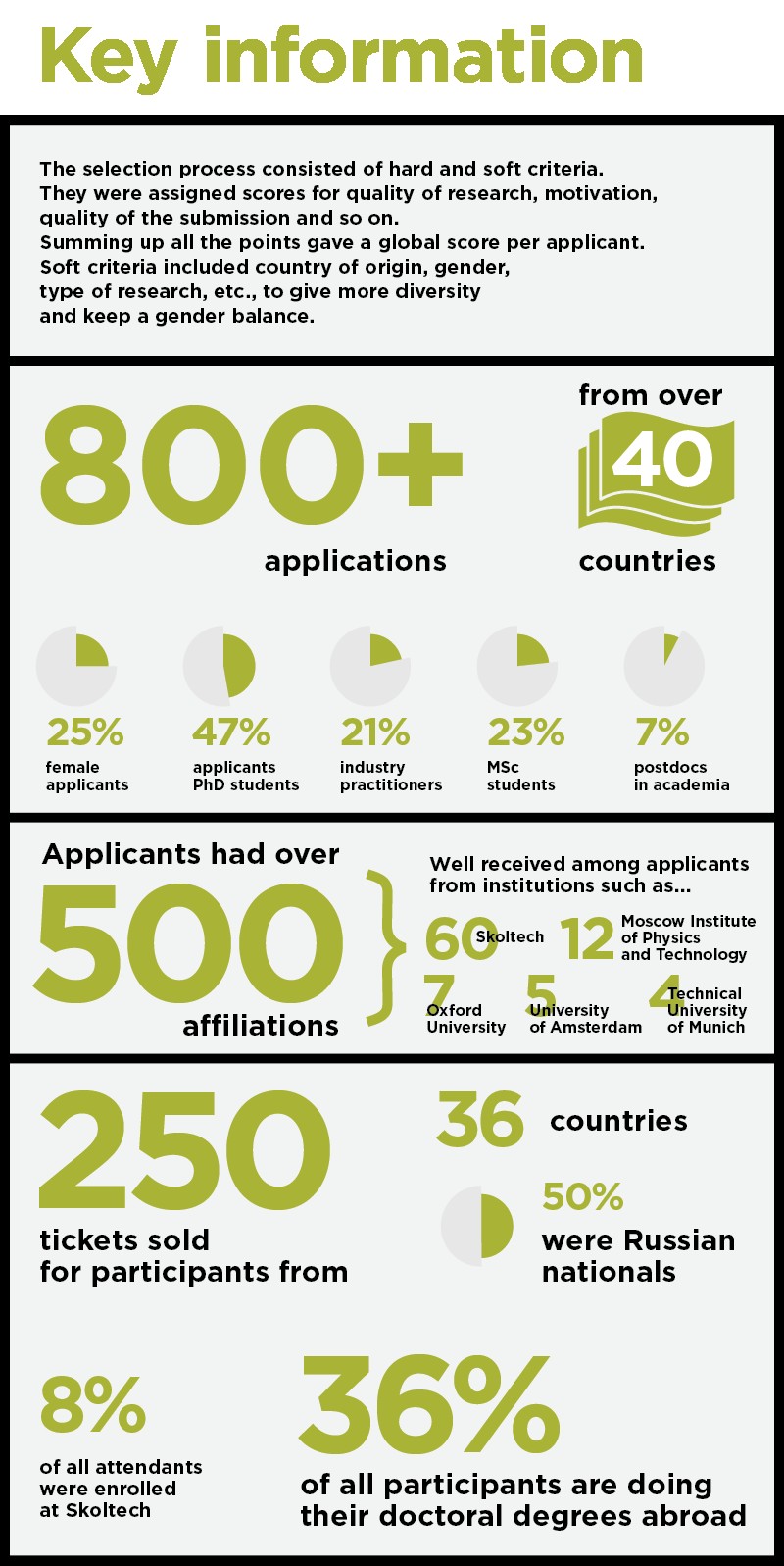The Machine Learning Summer School (MLSS, https://mlss.cc/) series goes back to 2002 when two very well known scientists – B. Schölkopf and A. Smola – in the framework of Max-Planck-Gesellschaft society, started it. Since then, thirty-six schools have been organized in different countries, mostly located in Western Europe and the US. MLSS covers topics that are at the core of modern machine learning, from fundamentals to state-of-the-art practice. MLSS is the most widely known school that is devoted to machine learning.
Skoltech’s Machine Learning Summer School (https://mlss2019.skoltech.ru), which took place during the last week of August and over the first week of September, was significant for a number of reasons. We caught up with the MLSS main organizer, Professor Evgeny Burnaev, who gave us his thoughts on the event’s outcome.
Could you please emphasize the significance of the school for the development of machine learning in Russia?
It was the first opportunity where we had such a large concentration of international experts and soon-to-be experts in Russia and attending the same event for such a long period. Before, it was unheard of that a machine learning event would attract researchers from more than 30 countries. As a result, our local talent benefitted significantly. They were able to network with peers from top institutions as well as meet some of the leading figures in the field. Local students could also compare their research and profiles with those from abroad and recognize that they are internationally competitive. I am sure that this will encourage more than one to look outwards and publish more at international venues, especially given that the summer school was a breeding ground for ideas. We can see that some of the brainstorming and informal discussions that took place back then are starting to materialize as publications.
Furthermore, the school also showed that it is possible to organize large-scale international events successfully and attract attention and support from local organizations. Local companies want to have their talent trained by the best people in the field, and international researchers are continually seeking to validate their ideas in the form of applications and feedback. Everyone benefits from strong relations between industry and academia.
Which are the major directions in the development of machine learning in Russia?
The development directions in machine learning in Russia are much the same as the rest of the world. However, I have heard that some industrial sectors [not just in Russia but also in the US], where ML can be efficiently applied, are old school in their way of doing things, one of these being regtech (regulation through technology). Financial regulation is a key area of the economy where machine learning is developing. We are trying to develop it for this purpose in order to increase efficiency. This is a challenging task; in order to protect privacy or control fraud, you need to process new types of data because the number of transactions will be enormous. There should also be a low “false alarm rate” (mistaken fraud) and a broad coverage in order to detect a significant amount of fraud. The challenge is that there are billions of transactions and so you need a very fast algorithm to detect fraud, but it is also important not to block users who are not actually committing fraud. If there is an error in the software, the number of false alarms increases, and if this happens too often then it will discourage people from using the application. On the other hand, you have to stop fraud.
Could you please name the main outcomes of MLSS?
We were able to provide an overview of the most relevant topics in machine learning right now. Our students know which themes and ideas are currently being discussed at the top venues and organizations in the world. For us, as a research university, it helped us corroborate our current research directions, strengthen our sense of the current zeitgeist in the community, and to validate ideas and outline new research projects.
What was the key major success?
To see that at the end of the school participants and speakers alike were very pleased and went home with relevant takeaways. Although we had a broad audience, we were able to offer something to everyone.
What was unique about the school?
This was the first time that such an event took place in Eastern Europe. Typically, these types of events can be found in North America, Western Europe, or Australia, but never before has our region had a machine learning event of this scope.
Who were the participants, where did they come from?
We had a broad international audience with diverse backgrounds and a significant female component. We had participants from all corners of the world, even from faraway places such as Australia and Argentina. Most of them are currently doing their doctoral studies at some of the best universities in the world in fields as diverse as finance, biology, or water treatment.
What are their impressions?
The feedback was extremely positive. We were running regular questionnaires at the end of each day to adapt to the needs of the audience. The most negative comment was that the school was too intense, but one could even see that as a compliment.
Overall, the participants were very satisfied, and even today we still receive “thank you” emails.
Would you like to conduct the school next year?
Definitely! It is already in the works, and we are incorporating what we learned from this year’s school to make it an even more memorable experience.
Could you please emphasize the importance of such events for Skoltech’s development?
Such events help show that Skoltech can compete in the major leagues of graduate education. We are a very young university and, outside of specific circles, our institution remains mostly unknown. In the machine learning community, the school has strengthened our institutional brand beyond what publication, authorship or an invited talk could have done. Months before the event, at conferences we would hear from participants who were aware of the summer school at Skoltech and who were thinking of applying or telling their students to participate.
What are the image dividends for Skoltech?
The payoff is manifold. With this antecedent, it is far easier to invite other highly regarded experts to our university, as it is a small community and word spreads. Similarly, we had participants from engineering branches who are applying machine learning methods to their work. Our university has a broad scope, and even members from programs such as Energy Systems or Biotechnology were able to meet and chat with the international peers at the summer school. In that regard, the summer school has definitely increased the visibility of all study programs.
Finally, the school reinforces the image that companies have of Skoltech, which is that we are conducting cutting-edge training and research here. This is definitely helpful during discussions on cooperation.
Key information
MLSS Speakers
1) Arthur Gretton, “Kernels for Representing and Testing Probability Distributions”
University College London, http://scholar.google.com/citations?user=OUv7J6QAAAAJ&hl=ru
2) Isabel Valera, Fairness & Interpretability
Max Planck Institute for Intelligent Systems, http://scholar.google.es/citations?user=cpdQqpsAAAAJ&hl=es
3) Joris Mooij, “Causality”
University of Amsterdam, http://scholar.google.nl/citations?user=Td3_kIwAAAAJ&hl=nl
4) Justin Solomon, “Geometric Techniques in ML”
MIT, http://scholar.google.com/citations?user=pImSVwoAAAAJ&hl=en
5) Marco Cuturi, “Optimal Transport”
Google Brain/ENSAE, https://scholar.google.com/citations?user=kQEydDMAAAAJ&hl=ru
6) Mark Girolami, “Probabilistic Numerics”
University of Cambridge, http://scholar.google.com/citations?user=BSoawXwAAAAJ&hl=en
7) Michael Bronstein, “Graph Neural Networks”
Imperial College London/Twitter, https://scholar.google.com/citations?user=UU3N6-UAAAAJ&hl=en
8) Michel Besserve, “ML and Neuroscience”
Max Planck Institute for Intelligent Systems,
http://scholar.google.com/citations?user=Nbq6kI0AAAAJ&hl=en
9) Nicolo Cesa-Bianchi, “Online Learning”
University of Milan, https://scholar.google.com/citations?user=BWADJUkAAAAJ&hl=en
10) Shimon Whiteson, “Reinforcement Learning”
University of Oxford, http://scholar.google.com/citations?user=9zeEI-cAAAAJ&hl=en
11) Ulrich Bauer, “Topological Data Analysis”
Technical University of Munich, https://scholar.google.com/citations?user=cMGWaM8AAAAJ&hl=ru
12) Yarin Gal, “Bayesian Deep Learning”
University of Oxford, http://scholar.google.co.uk/citations?user=SIayDoQAAAAJ&hl=en
13) Francois Bachoc, “Advances in Gaussian Processes”
University of Paul Sabatier, http://scholar.google.com/citations?user=Fv36axgAAAAJ&hl=fr
14) Matus Jan Telgarsky, “Deep Learning Theory”
University of Illinois, https://scholar.google.com/citations?user=Fc-5yRIAAAAJ&hl=en
15) Sergey Kravchenko, “AI and Analytics in Aerospace”
Head of Boeing Russia
16) Evgeny Burnaev, “Deep Bayesian Generative Models for Knowledge Transfer and MRI processing”
Skoltech, https://scholar.google.ru/citations?hl=ru&user=pCRdcOwAAAAJ
17) Leonid Zhukov, “Industrial ML vs. Academia: lessons learned”
BCG Gamma
MLSS sponsors:
- Huawei
- Philips
- Abbyy
- Yandex
- Bosch
- Boeing
- Data Reply
- Zyfra
- BCG Gamma
MLSS feedback
“Thank you for organizing this excellent summer school! I had a very nice time.” - Shimon Whiteson, University of Oxford
“I would like to thank you for organizing my stay in Moscow. I do hope to see you again in Paris!” - William Clements, Unchartech (Industial R&D Lab, Paris)
“Many thanks again for inviting me to MLSS. It was great to visit beautiful Moscow and Skoltech. I had very good interactions with the students.” - Michael Bronstein, Imperial College London
“Thank you for the invitation, this week has been wonderful with interesting conferences and the opportunity to discover Moscow.” - François-Pierre Paty, student of Marco Cuturi and responsible for the Optimal Transport tutorial
“I appreciate all your support throughout this trip. I had a very nice time! Thank you and good luck with the remainder of the program and future programs at Skoltech.” - Matus Telgarsky, University of Illinois at Urbana Champaign
Sponsors and Partners:
“Thanks for organizing this great machine learning summer school! The six Swedish PhD students were thrilled and satisfied.” – Mats Hanson, Sweden AI society AI.SE
“Let me thank you for participating in the organization of the MLSS Open Community Day. In the end, we had more than 500 participants, which is great! We’ve also found a space for cooperation with Alexander Filippov and his IT Algorithm Laboratory.” – Danila Doroshin, Huawei
“A big thank you to the organizers! I have had a fantastic time at the school and I have learned a lot. Большое спасибо!” – Johannes Oberreuter, Data Reply
“It is a great conference! We had several high quality conversations with students after the speech.” – Mao Feng, Huawei
Participants:
“Thank you all for the organization, it was a fantastic couple of weeks!” – Pascal Notin, McKinsey and Company
“Many thanks for the smooth organization of such an amazing international event! It was super-useful from both the educational and networking perspectives.” – Vitaly Zankin, Skoltech student
“В школе было все хорошо спланировано и организовано. Учебный процесс проходил грамотно. Считаю очень удачным преподавательский состав и курсы. Я очень рада, что мне удалось попасть на такую крутую школу, я получила громадный опыт, который обязательно применю в будущем.” – Анна Телегина, Huawei
“For me, MLSS was a good opportunity to meet new people and to learn a lot of interesting stuff from great minds from all around the world. I made many connections with experts from my field.” – Евгений Ковалев, Computer Vision consultant researcher, Huawei
MLSS Open Community Day
On the 31st of August, a unique one-day event open to the broader Machine Learning community in Moscow. MLSS Community Day is a free one-day event for everyone interested in machine learning. Speakers from premier institutions in machine learning such as the University of Oxford, University College London, Max Planck Institute as well as renowned companies will cover the latest advances in applications for healthcare, telecommunications, NLP, finance, and quantum computing.
Open Community Day statistics:
1) 1300+ registrations
2) 500+ participants from leading industrial companies and universities in Moscow
3) The latest advances in Reinforcement Learning, Quantum Technologies, Cybersport and other applications of ML through:
- 21 presentations (3 parallel sessions),
- 2 round tables (ML as a Fuel for Telecom; ML is the next breakthrough in Healthcare?) and
- a poster session
All materials (presentations, photos) from MLSS and Open Community Day can be downloaded through the link.


